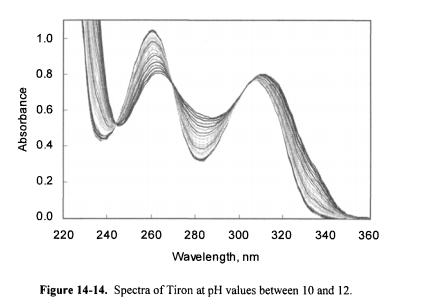Multiple-Wavelength Regression. Dissociation of the second hydrogen ion of Tiron ( 1,2-dihydroxybenzene-3,5-disulfonate, H2L) does not begin until the pH is raised above 10. The pKaz of Tiron was determined spectrophotometrically by recording the spectrum at constant Tiron concentration and varying pH. The spectra are shown in the following figure; the absorbance readings (from 226 nm to 360 nm in 2-nm increments) at each pH value are tabulated on the CD that accompanies this text.

The equilibrium reaction being measured is (charges omitted for clarity)
![]()
The dissociation of H2L to HL- is complete at pH values of 10 and higher, and can be neglected. The concentrations of L and HL are given by the following expressions:

where LT is the total concentration of Tiron in the solution. The absorbance at a given wavelength is the sum of the contributions of the two species, that is,
![]()
where E is the molar absorptivity of the species, a constant at a given wavelength. Calculate the Ka value and the EL and EHL values at each wavelength, in one global minimization. (Excel’s Solver can handle up to 200 changing cells, so we are pushing the limit here.) You will need to calculate the sum-ofsquares-of-residuals for each wavelength, and minimize the “grand total” for all wavelengths. The Solver may have trouble “digesting” all this data. If so, use the Solver with data at a single wavelength to get the values of Ka, E~ and EHL, then use these as starting value for a global minimization.

